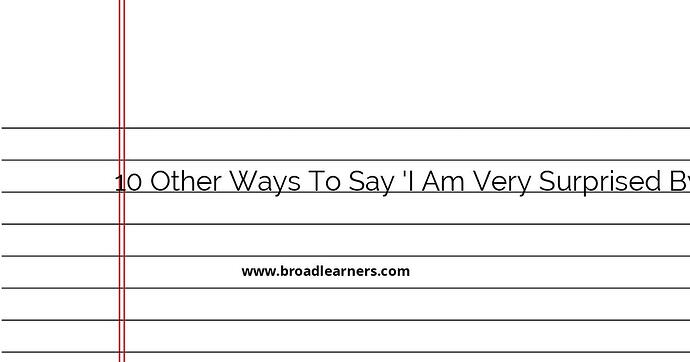Expressing surprise can be done in many different ways. While saying 'I am very surprised by you' is one option, there are several alternative phrases you can use to convey the same sentiment. Here are ten other ways to express surprise:
- I am utterly amazed by you
- You have completely astonished me
- Your actions have taken me aback
- I'm in awe of what you've done
- You've left me speechless
- You've caught me off guard
- I can't believe my eyes/ears
- This is truly unexpected
- You've really surprised me
- I am blown away by your actions
Let's explore each alternative in more detail and provide examples to help you understand how to use them in different situations.
1. I am utterly amazed by you
This phrase expresses a sense of complete astonishment. Instead of simply being surprised, you are emphasizing the level of shock and admiration you feel towards the person's actions. It is a strong and emphatic way of expressing surprise.
Example:
I am utterly amazed by you! Your talent is simply outstanding.
2. You have completely astonished me
This phrase conveys a sense of complete disbelief and astonishment. It suggests that the person's actions have left you in a state of sheer surprise and wonder. It is a more intense way of expressing surprise.
Example:
You have completely astonished me with your incredible performance. I did not expect such talent.
3. Your actions have taken me aback
This phrase implies that the person's actions or words have caught you off guard and surprised you. It suggests that you were not prepared for what they did or said, and it has surprised you to the point of being taken aback.
Example:
Your actions have taken me aback. I didn't expect you to go above and beyond for this project.
4. I'm in awe of what you've done
This phrase conveys a sense of admiration and astonishment. It suggests that you are impressed and amazed by the person's actions, to the point that you are in awe of them.
Example:
I'm in awe of what you've done. Your dedication and hard work are truly remarkable.
5. You've left me speechless
This phrase indicates that the person's actions or words have left you without words or unable to express your thoughts and emotions adequately. It implies that their surprising behavior has rendered you speechless.
Example:
You've left me speechless with your selfless act of kindness. I am truly touched.
6. You've caught me off guard
This phrase suggests that the person has surprised you by doing something unexpected or saying something surprising. It conveys the idea that you were caught unprepared or unaware of their actions.
Example:
You've caught me off guard with your sudden announcement. I wasn't expecting this news.
7. I can't believe my eyes/ears
This phrase implies that what you are witnessing or hearing is so surprising that you can't believe it is real. It emphasizes your disbelief and astonishment.
Example:
I can't believe my eyes! This artwork is absolutely breathtaking.
8. This is truly unexpected
This phrase expresses that what you are experiencing or witnessing is completely surprising and not anticipated. It conveys the idea that the situation or action is beyond what you could have imagined.
Example:
This is truly unexpected! I never thought I would see you here today.
9. You've really surprised me
This phrase indicates that the person's actions or words have genuinely taken you by surprise. It conveys a sense of pleasant shock and astonishment.
Example:
You've really surprised me with your thoughtfulness. Thank you for the unexpected gift.
10. I am blown away by your actions
This phrase suggests that you are incredibly impressed and amazed by the person's actions. It conveys the idea that their behavior has had a powerful impact on you, to the point of feeling figuratively 'blown away'.
Example:
I am blown away by your actions. Your bravery and determination are truly inspiring.
Remember, these alternative phrases can help you express surprise in different contexts and add variety to your language. Choose the phrase that best suits the situation and your level of surprise, and use it to convey your feelings effectively.
Did I miss anything? Respond below
